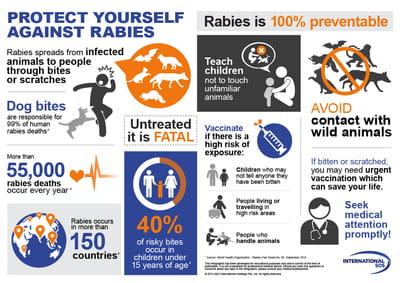Rabies
Could a dog bite transmit rabies?
Do NOT let rabies disrupt your business
In the past year, International SOS has helped over 360 people who had contact with a suspected rabid animal.
It is World Rabies Day on 28 September 2015. We support the initiative
Rabies occurs on every continent except Antarctica - and is present in over 150 countries and territories.
Our Assistance Centres take calls related to animal bites nearly every day, with over 90% of cases originating in business hotspots: India or South East Asia. Rabies is a preventable disease.

International SOS is playing a leading role in providing specific advice and support for medical and security risks, no matter where your people are. Our specialist teams are working around the clock to keep your employees protected and business moving.
- Assess and understand the risks of exposure at your destination: We analyse and evaluate any location you are sending your employees to and recommend measures that help mitigate risks.
- Educate your travellers before they depart: Through our specialist medical information and education programmes, we help you to prepare your travellers for the local situation as well as advise on measures to take should the situation deteriorate.
- Around the clock access for your travellers to specific local advice: Our qualified doctors and security specialists are there for your employees, no matter what, where or when.
- Stay connected with your travellers and keep track of them in a high-risk location: We make sure your employees receive the latest information and are prepared at all times.
Achieve your goals and avoid loss of time and productivity by preparing your employees for travel and supporting them when they are in unfamiliar and remote locations. We help to keep your people healthy and safe, so you can focus on your core business activities.
FURTHER INFORMATION
International SOS Regional Medical Director, Dr Jonathan O’Keeffe, states: “We strongly recommend travellers and expatriates to consider vaccination before they go to countries where there is a high risk of disease and if they are going to participate in activities where they are likely to be exposed. Longer-term visitors are at particular risk.”
We recommend to our clients that in high-risk situations, even if you have received
Many of the high-risk locations don’t have access to quality treatment for dog bites. So anyone who is bitten may need to be evacuated to a centre that can provide the necessary treatment.



